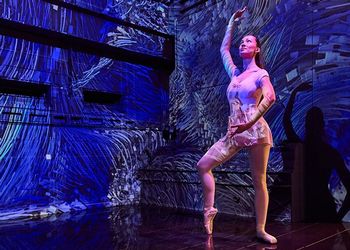The Journey Here

My favorite book of all time is Anne of Green Gables. It’s a story of an orphan girl with a wonderful imagination that gets adopted by a spinster, Marilla, and her brother, Matthew. The siblings adopt Anne thinking they are adopting a boy to help around the farmhouse as they age, only to discover their mistake at the last minute. Marilla wants to return Anne to the orphanage but her brother, who instantly took a liking to the spunky, talkative and lovable girl, insists they keep her.
I remember the day I received the email that I was going to Michigan State University on a full MasterCard scholarship. My joy knew no bounds and I laughed and cried, overjoyed and relieved at the prospects. Later on I thought to myself, could this be real? Maybe there was a mixup. I waited for the phone call or letter informing me that it was all a mistake. However, like Anne, I had made up my mind to do whatever it took to get them to like me enough to keep me, mistake or not.
The day before my departure I walked home slowly and passed the kiosk at the corner of my street made from old, rusty pieces of zinc. The old Berom shopkeeper who owns the kiosk always lets me buy stuff on credit even though I am a low income earner. I have known him since I was a young girl and he is like a father to me. It is all about taking things until an unknowable later; that’s the Nigerian system of a credit. He wears a threadbare kaftan and old worn out slippers, sewn several times over in bright red thread. I chuckle to myself. It’s not what it looks like that’s important but the fact that it’s still functional. Suddenly, I remember that I have not said goodbye to him, my good benefactor, and I retrace my steps back towards the kiosk. I could start a lifelong vendetta if I failed to say farewell to any relative, friend, neighbor or companion. The list was endless.
“Sannu, Baba (Hello, father),” I say kneeling slightly when I sight him as I enter the kiosk. In Nigeria you never greet an elder standing up straight.
“My daughter, how are you?” He smiles brightly.
“I am fine, Baba. You know I am leaving tomorrow, right?”
“That is true, my daughter. I will miss you very much.” His face is suddenly pensive. “I pray that God will bless you and keep you. You will be a shining star in America.”
“Amen,” I answer.
He goes on and on for a minute more and I stand patiently waiting for him to finish. He rummages through his tiny desk in the kiosk and gives me a one thousand naira note (approximately $3).
“Yi hankuri (saying for humbly giving a gift) my daughter, take this and buy bread and eat on the road, okay.” He pushes the crumpled note to me.
“Na gode baba (thank you, father),” I say curtseying over and over, my smile so wide. I walk away thinking of the money even as I slip it into my bag. This is the Nigerian way of giving a gift by attaching it to something you imagine the person may need.
It is dusk and I continue my walk home, slowly soaking in the rays of the sun as it goes behind the buildings for the night. Nearby I see purple and blue bougainvillea flowers from the overgrown rambling bush nearby. The weight and size of the stems lean heavily on the fence, pushing it downwards. I am quite certain that by the end of the next rainy season this fence will not be standing any more. The realization that I will not be here to see who triumphs in this battle of plant versus fence makes me a bit sad.
The next morning, I am pleasantly surprised when I see the people that have gathered to say goodbye to me. Hugs and kisses are shared, prayers are said, advice is given, stern warnings and admonishments are unleashed and all the while I am waiting for something to happen that’ll make all this turn out to be a hoax. It simply cannot be true, nothing this good has ever happened to me.
A FEW MONTHS AGO
“Tami would you like to have a drink after class on Thursday?” Tim, the cute boy in my class, asked. “A bunch of us are going for TGIF at the Green Tavern.”
“Sure,” I answered nodding my head. Since I got to America I have not really made friends or hung out much. Maybe this was my opportunity to do both. I grabbed my bag and jumped into the car. At the bar we all stood around until the barrista saw us and came towards us. In Nigeria I would shout “barman” and someone would come running. We ordered drinks and I drank mine slowly, mesmerized with the taste of American brew. What I could really use was some spicy hot suya (skewered beef) or chicken, I thought. Beer always goes with a meat dish at home, not a salad or sandwich. We shared our best Trump jokes and did impersonations of our favorite faculty members. We laughed till our tummies ached, danced on our seats and had a jolly good time. We jumped from bar to bar, a concept that I simply could not understand. Why couldn’t we just stay in one place and enjoy some other bar on another day. But, I was in America and this is the American way. It was past midnight and everyone was yawning or stifling a yawn.
Everyone brought out their wallets and put some money on the table in front of Tim. I could see them making mental calculations. I brought out my wallet too and put a five-dollar bill in front of Tim.
“You gotta throw in something extra for a tip,” Tim said.
I suddenly felt naked because I didn’t have a cent more on me. Awkward silence.
“I’m outta cash,”, I finally said. “Is there an ATM machine in here?” “Don’t worry, I’ve got you covered. You can pay me back next time,” Tim said. I assumed that since he asked me out for drinks he was going to pay. Oh God, I groaned, another thing to get used to.
A FEW YEARS AGO
I didn’t know whose party it was but I followed my friends anyways. That’s what Nigerians did. Invitations were simply a way of spreading the news far and wide, not a way to restrict attendance. The party scene was epic. The music was loud and everybody danced in a frenzy, sweat pouring out of their bodies. A wide array of snacks and finger food welcomed me. But, it was the smell of roasted meat and pepper that filled my nostrils and lured me to the nearest table, where I eagerly took a seat and loudly called the server to bring me some food. My plate came heaped high with shaki (meat dish made from entrails) pepper soup. The steam of the hot pepper soup was a sharp contrast to the cold bottle of Coke I held in my hands.
“Stand up let’s dance,” my friend yelled over the deafening music.
The opening notes of a new song filled the speaker and I stood up. Gyrating and twisting my body to the rhythm I danced long and hard with my friends all night eating and drinking till our hearts content. The funny thing is I did not have the slightest idea of whose party it was, who the host was or what the occasion was. The important thing is that we attended….that is the Nigerian way.
TODAY
I plug in my earphones and wait for the bus along with a bunch of other students. The earphone culture had replaced conversation and the norm is to silently stand together until the bus comes. I don’t know whether it was the silence that irked me or the fact that no greetings or pleasantries were being exchanged. I prefer the Nigerian way of loudly greeting friends and strangers whenever you saw them, enquiring of their parents in the village and even their domestic animals. Here, the only people that spoke were couples, quietly whispering in each other’s ears. The way they held each other, touching and kissing was surprising to me. Back home that was considered foreplay and relegated to the bedroom. I appreciated the fact that couples wanted the world to know of their love but at home anybody that exhibited such public display of emotions would be considered a daniska (vile) because no one wanted to admit that his son or daughter would be that shameless.
Browsing through the sound tracks on my phone I select Yemi Alade’s hit song Africa and pressed play. Gosh, it sounds so good, I close my eyes and my head immediately moves to the beat followed by my body. I sway to the music and in this moment, I am at home in Nigeria and can even smell the kosai (bean cakes) and masa (rice cakes) that women sell at the bus stops to commuters that have not had breakfast to eat on the bus.



